Unit3 Robots Reading1课件
文档属性
| 名称 | Unit3 Robots Reading1课件 | 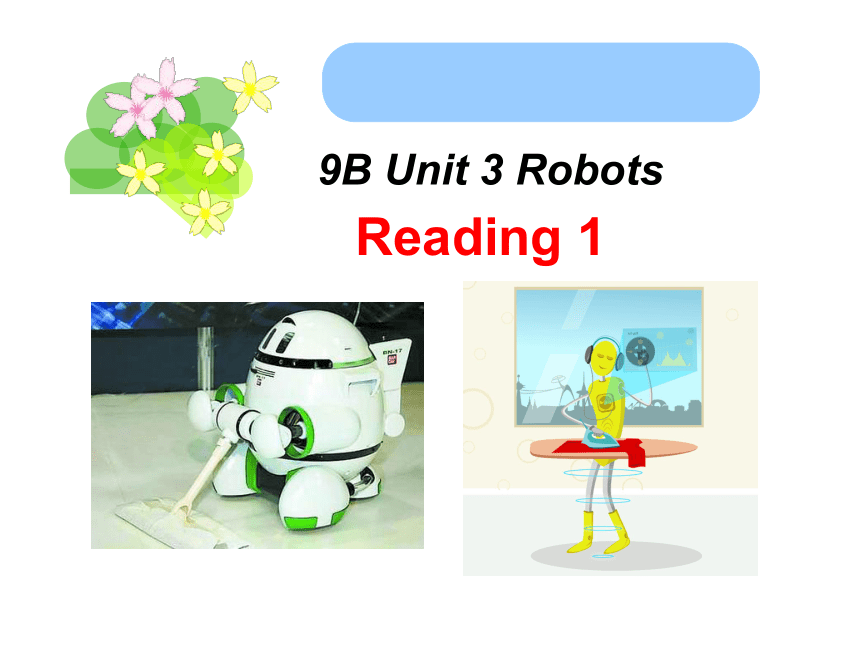 | |
| 格式 | zip | ||
| 文件大小 | 1.9MB | ||
| 资源类型 | 教案 | ||
| 版本资源 | 牛津译林版 | ||
| 科目 | 英语 | ||
| 更新时间 | 2015-05-25 16:52:11 | ||
图片预览

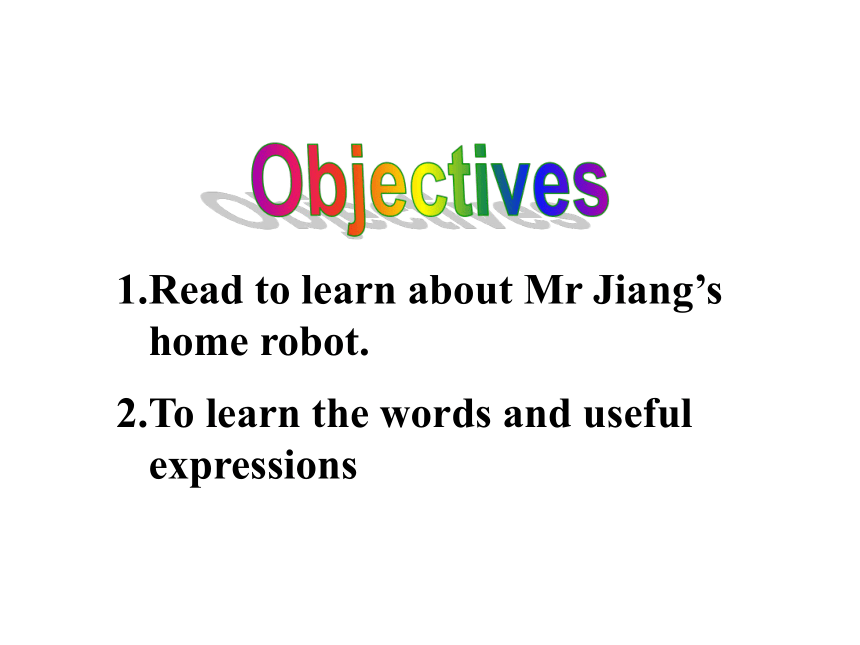
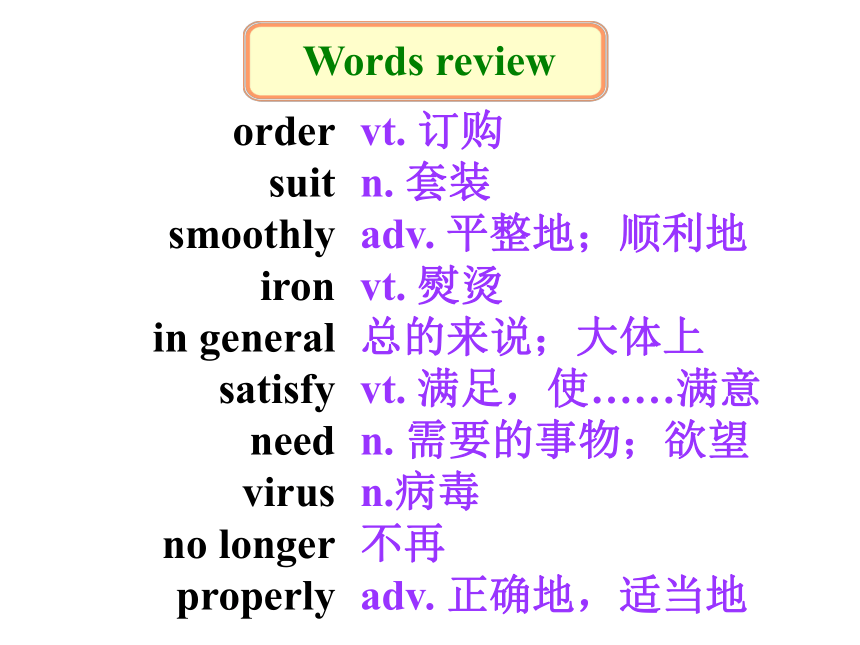
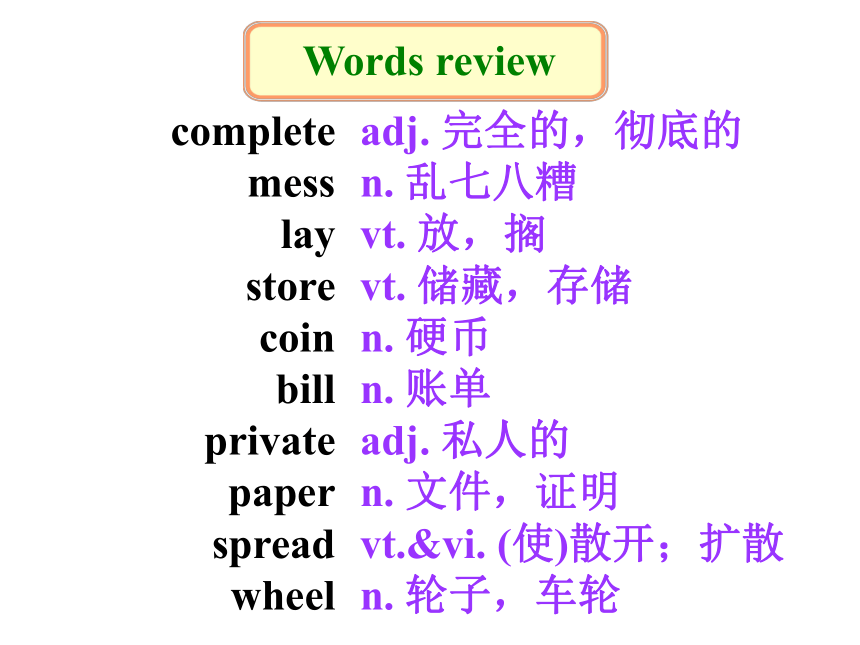


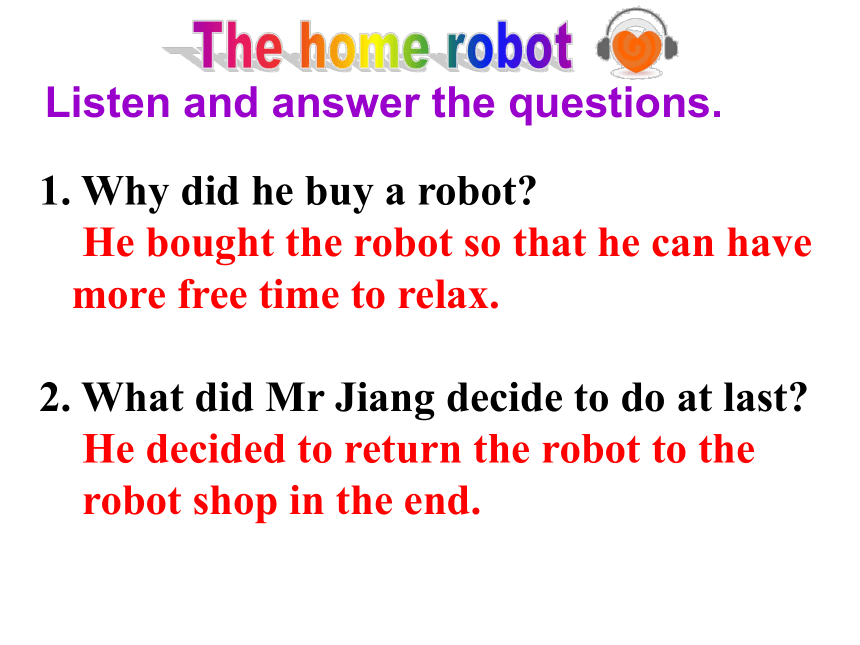
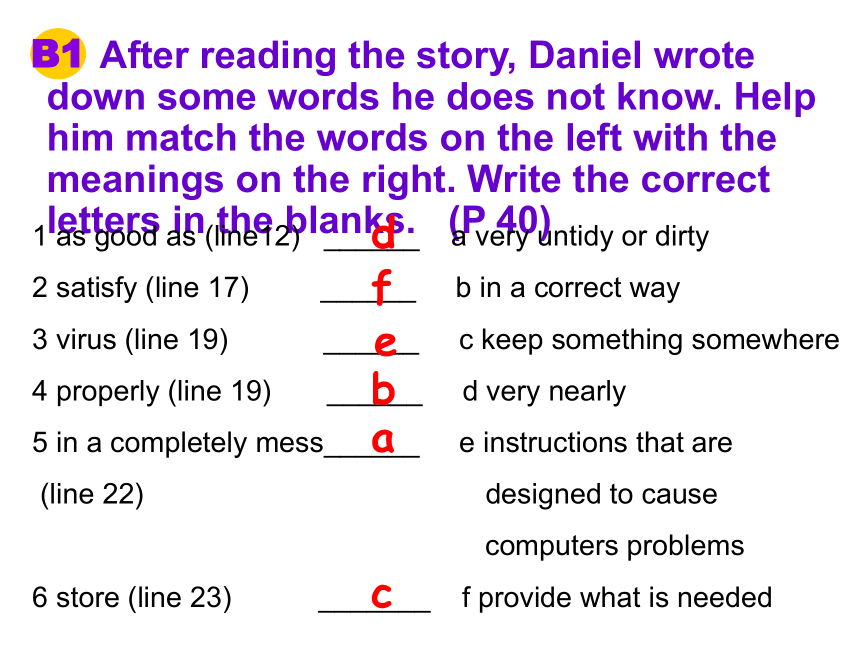
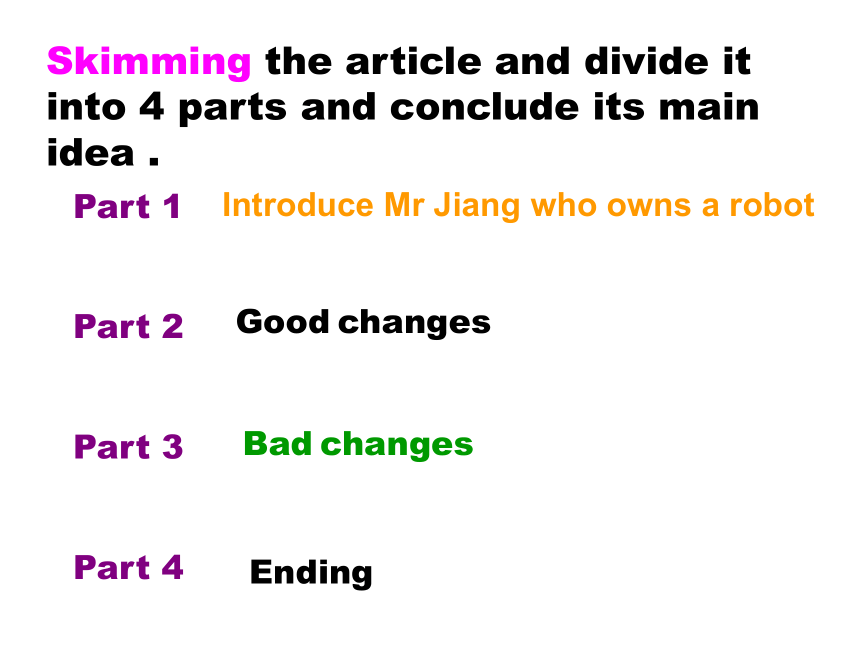
文档简介
课件23张PPT。9B Unit 3 RobotsReading 1ObjectivesRead to learn about Mr Jiang’s home robot.
To learn the words and useful expressionsorder
suit
smoothly
iron
in general
satisfy
need
virus
no longer
properlyvt. 订购
n. 套装
adv. 平整地;顺利地
vt. 熨烫
总的来说;大体上
vt. 满足,使……满意
n. 需要的事物;欲望
n.病毒
不再
adv. 正确地,适当地complete
mess
lay
store
coin
bill
private
paper
spread
wheeladj. 完全的,彻底的
n. 乱七八糟
vt. 放,搁
vt. 储藏,存储
n. 硬币
n. 账单
adj. 私人的
n. 文件,证明
vt.&vi. (使)散开;扩散
n. 轮子,车轮The development of robotsDo you want to have a kind of home robot?
Which one do you need most?The home robot Listen and answer the questions.1. Why did he buy a robot?
He bought the robot so that he can have more free time to relax.
2. What did Mr Jiang decide to do at last?
He decided to return the robot to the
robot shop in the end. After reading the story, Daniel wrote down some words he does not know. Help him match the words on the left with the meanings on the right. Write the correct letters in the blanks. (P 40)B11 as good as (line12) ______ a very untidy or dirty
2 satisfy (line 17) ______ b in a correct way
3 virus (line 19) ______ c keep something somewhere
4 properly (line 19) ______ d very nearly
5 in a completely mess______ e instructions that are
(line 22) designed to cause
computers problems
6 store (line 23) _______ f provide what is neededd f e b a c Skimming the article and divide it into 4 parts and conclude its main idea .Part 1
Part 2
Part 3
Part 4Introduce Mr Jiang who owns a robotGood changes Bad changes Ending Reading Paragraph 1 and answering the questionsWhat’s Mr Jiang’s job?
Why did he decide to buy a robot for himself?He is a manager of a big company in Sunshine Town.He wanted to have more free time .Reading Paragraphs 2-4 and filling in the form belowIn the morning make iron prepareReading Paragraphs 2-4 and filling in the form belowDuring the day housework sweep / clean go shoppingReading Paragraphs 2-4 and filling in the form belowIn the evening cook tidy up watch do some readingThe robot made Mr Jiang’s life much easier.
The robot ironed Mr Jiang’s business suit
at the weekend.
3. Mr Jiang had to do the housework every day.
4. Mr Jiang always went shopping with his robot.
5. The robot would wash the dishes while Mr Jiang
was at work.
6. Mr Jiang’s robot could cook delicious dinner for him.
7. The robot could relax and watch TV after dinner.
8. Mr Jiang was very happy to have a robot in the
beginning.TFFFFinishing the true or false.TTFTeveryday.didn’t have to dodidn’t goMr JiangReading Paragraph 5 and choosing the wrong things that the robot did He cooked breakfast at the right time.
He woke up Mr Jiang at the wrong time.
He threw Mr Jiang’s food into the rubbish bin.
He stored Mr Jiang’s milk in the rubbish bin.
He moved too fast and knocked things over.
He went out and often lost his way home.
He made a completely mess in Mr Jiang’s flat.
He spread coins, bills and papers on the bed.Reading Paragraph 6 and discuss the questionDo you think the robot is always good in our life?
Robots can help people a lot, but they can also be too much trouble!Work in pairs to discuss the advantages and disadvantages of having a robot. Daniel is thinking of the good and bad points of having a robot. Help him complete the lists below using the information in the story on pages 38 and 39. (P 40)B2Good points1 With the robot’s help, I will have a lot more time to __________.
2 It can make _________for me in the morning.
3 It can ________ my clothes.
4 It can ____________at the supermarket if I am busy.
5 It can ___________ after diner.
6 My flat will look _________________.relaxbreakfastiron go shopping tidy up as good as newBad points1 If the robot catches __________, it will cause a lot of problems.
2 It might ______________ early in the morning.
3 It might lay my food on the ________.
4 It might store milk in the ____________.
5 It might spread coins, bills and my _________________ all over the floor.
6 It might move too fast and _________________. a viruswake me uprelax rubbish bin private papers knock things overB3(P 41)T F T T F makeYes.T T T T F robot shopHomeworkRead the passage aloud.
Finish off the additional exercises.
To learn the words and useful expressionsorder
suit
smoothly
iron
in general
satisfy
need
virus
no longer
properlyvt. 订购
n. 套装
adv. 平整地;顺利地
vt. 熨烫
总的来说;大体上
vt. 满足,使……满意
n. 需要的事物;欲望
n.病毒
不再
adv. 正确地,适当地complete
mess
lay
store
coin
bill
private
paper
spread
wheeladj. 完全的,彻底的
n. 乱七八糟
vt. 放,搁
vt. 储藏,存储
n. 硬币
n. 账单
adj. 私人的
n. 文件,证明
vt.&vi. (使)散开;扩散
n. 轮子,车轮The development of robotsDo you want to have a kind of home robot?
Which one do you need most?The home robot Listen and answer the questions.1. Why did he buy a robot?
He bought the robot so that he can have more free time to relax.
2. What did Mr Jiang decide to do at last?
He decided to return the robot to the
robot shop in the end. After reading the story, Daniel wrote down some words he does not know. Help him match the words on the left with the meanings on the right. Write the correct letters in the blanks. (P 40)B11 as good as (line12) ______ a very untidy or dirty
2 satisfy (line 17) ______ b in a correct way
3 virus (line 19) ______ c keep something somewhere
4 properly (line 19) ______ d very nearly
5 in a completely mess______ e instructions that are
(line 22) designed to cause
computers problems
6 store (line 23) _______ f provide what is neededd f e b a c Skimming the article and divide it into 4 parts and conclude its main idea .Part 1
Part 2
Part 3
Part 4Introduce Mr Jiang who owns a robotGood changes Bad changes Ending Reading Paragraph 1 and answering the questionsWhat’s Mr Jiang’s job?
Why did he decide to buy a robot for himself?He is a manager of a big company in Sunshine Town.He wanted to have more free time .Reading Paragraphs 2-4 and filling in the form belowIn the morning make iron prepareReading Paragraphs 2-4 and filling in the form belowDuring the day housework sweep / clean go shoppingReading Paragraphs 2-4 and filling in the form belowIn the evening cook tidy up watch do some readingThe robot made Mr Jiang’s life much easier.
The robot ironed Mr Jiang’s business suit
at the weekend.
3. Mr Jiang had to do the housework every day.
4. Mr Jiang always went shopping with his robot.
5. The robot would wash the dishes while Mr Jiang
was at work.
6. Mr Jiang’s robot could cook delicious dinner for him.
7. The robot could relax and watch TV after dinner.
8. Mr Jiang was very happy to have a robot in the
beginning.TFFFFinishing the true or false.TTFTeveryday.didn’t have to dodidn’t goMr JiangReading Paragraph 5 and choosing the wrong things that the robot did He cooked breakfast at the right time.
He woke up Mr Jiang at the wrong time.
He threw Mr Jiang’s food into the rubbish bin.
He stored Mr Jiang’s milk in the rubbish bin.
He moved too fast and knocked things over.
He went out and often lost his way home.
He made a completely mess in Mr Jiang’s flat.
He spread coins, bills and papers on the bed.Reading Paragraph 6 and discuss the questionDo you think the robot is always good in our life?
Robots can help people a lot, but they can also be too much trouble!Work in pairs to discuss the advantages and disadvantages of having a robot. Daniel is thinking of the good and bad points of having a robot. Help him complete the lists below using the information in the story on pages 38 and 39. (P 40)B2Good points1 With the robot’s help, I will have a lot more time to __________.
2 It can make _________for me in the morning.
3 It can ________ my clothes.
4 It can ____________at the supermarket if I am busy.
5 It can ___________ after diner.
6 My flat will look _________________.relaxbreakfastiron go shopping tidy up as good as newBad points1 If the robot catches __________, it will cause a lot of problems.
2 It might ______________ early in the morning.
3 It might lay my food on the ________.
4 It might store milk in the ____________.
5 It might spread coins, bills and my _________________ all over the floor.
6 It might move too fast and _________________. a viruswake me uprelax rubbish bin private papers knock things overB3(P 41)T F T T F makeYes.T T T T F robot shopHomeworkRead the passage aloud.
Finish off the additional exercises.
